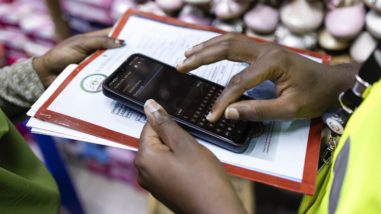The Industrial Revolution. The Digital Revolution. The French Revolution. The American Revolution. Whether economic or technological in nature, social or political, they all have one thing in common: what came after was fundamentally different than what came before, and the changes wrought could not be ignored.
What about the Data Revolution? What kind of revolution will it be?
Will the Data Revolution, which will be heralded in alongside the agreement about the 2030 Sustainable Development Goals, change the way we work? Will it change the way we think? And can it fundamentally alter the relationship between the powerless and the powerful? I’m hoping for all three.
But realizing the full potential of the Data Revolution will require setting even more ambitious expectations, and taking greater risks. It will require confronting the link between our data and ourselves.
The way we collect, protect, and use information is a reflection of a society’s values. That means data-as-usual reinforces current patterns of inequality and marginalization; and it means progressive social change can be propelled and reinforced when the way we work with data is consistent with the better world we’re seeking.
Just think, for a moment, about gender. Assumptions about gender permeate data collection, from the now-contested presumption that gender is a binary variable to the many manifestations of gender roles that are embedded in standard household surveys. If a family includes a wife and a husband, the husband is listed as the “head of household.” Questionnaires that ask only about “primary occupation” often miss income-earning activities that women engage in, if the interviewees self-identify as “housewives,” as they often do in cultures where men are seen as producers and women as reproducers. Similarly, male respondents are rarely if ever asked about care-giving. Even data collection that is explicitly intended to understand gender-specific experience cannot break loose of social values: to measure violence against women, to take one example, those who are collecting and analyzing data have to confront questions about behavioral boundaries within intimate relationships. In most societies, the question of whether marital rape exists is far from settled, so how can information about that kind of violence be obtained if it’s not even conceived of as possible?
And data related to gender is certainly not the only type of information that implicitly perpetuates the status quo. Everything from the categories we use for race and ethnicity to the way we measure income and consumption to the geographic boundaries we use—“rural?” “urban?”—carry with them the assumptions and values of the society in which people create those survey questions and analyze those variables. That means those who want to challenge assumptions and shape social values have a huge responsibility and an equally large opportunity: We have to make sure that the work we do to improve and intensify the collection and use of data helps propel change, not stifle it.
Practically, what does this mean? First, it means embracing the interaction between the political and the technical, and challenging the view that data about people and our lives exists outside of social constructs. It means experimenting with new ways to conceptualize and capture information: using ethnographic methods to arrive at different ways of thinking about work and relationships, for instance, and inviting into the conversation people supposedly represented in the numbers. And it means fully taking advantage of data that are a byproduct of actions and transactions, rather than solely depending on data constructed and collected for the purpose of answering pre-set questions. Yes, here I’m talking about some parts of the big data universe, like social media feeds, data from remote sensing, and transactional information showing how people work, consume, and move. I’m sure those who think more deeply about these issues than I do can expand on (or challenge) this list, and I surely hope that happens as the Data Revolution unfolds.
At the Hewlett Foundation, we are pleased to be anchor partners within the Global Partnership for Sustainable Development Data, working with remarkably committed and future-oriented individuals and organizations. At the very least, we expect this Partnership to be a leading force in helping apply more and better data to overcome development challenges. But even beyond that, we expect this Partnership to marshal the energy, resources, brainpower, and passion to revolutionize the way we think about the power of data itself.



